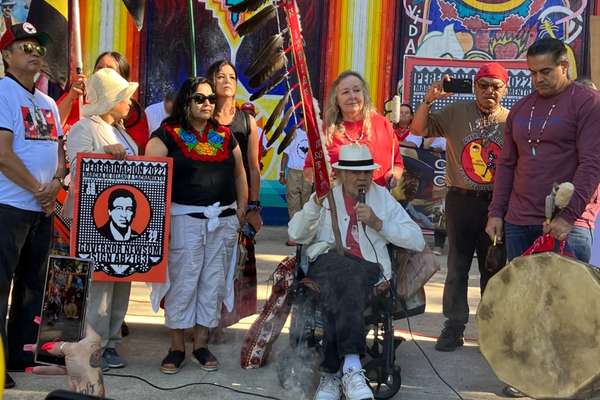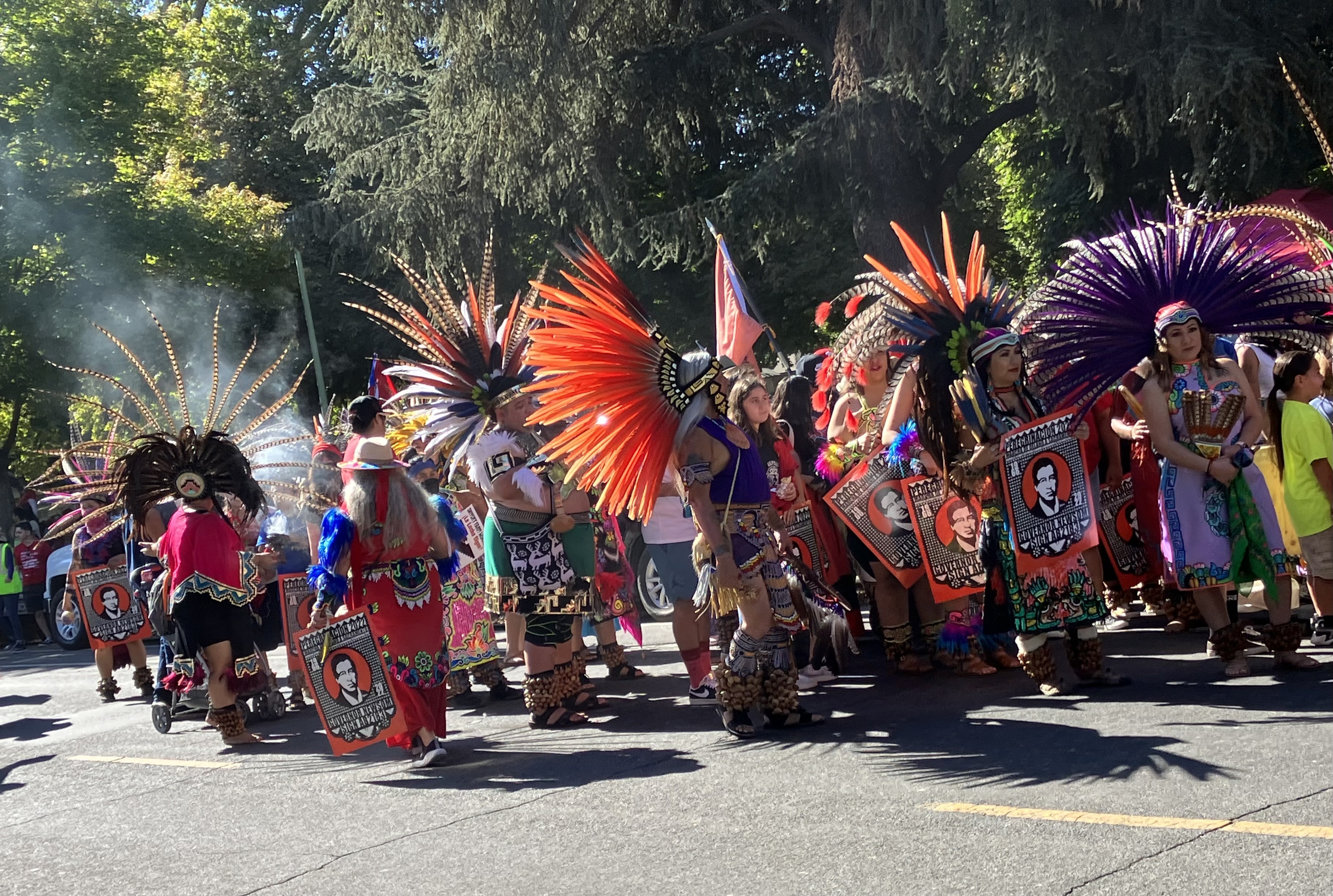
- Details
- By Arthur Jacobs
SACRAMENTO, Calif.—The national and local chapters of the American Indian Movement (AIM) joined the United Farm Workers (UFW) on a 24-day “March for the Governor’s Signature” to encourage California Governor Gavin Newsom (D) to sign Assembly Bill 2183, which provides farmworkers more opportunities to vote in elections.
The 335-mile march from Delano to Sacramento began on Aug. 3 and followed the same route UFW co-founder Cezar Chavez led farm workers on during the 1966 march that resulted in the organization’s first union contract.
On Friday, which was California Farm Worker Appreciation Day, thousands gathered in Sacramento to conclude the march with a rally at the state capitol, where longtime AIM spiritual leader Fred Short provided a prayer for the crowd.

Norman “Wounded Knee” DeOcampo (Miwok), a longtime Native American activist and member of AIM, also participated in the march.
“American People of Turtle Island, WAKE UP,” DeOcampo told Native News Online. “Anybody that eats food should join this walk. Without the Mexicans, Filipinos, Native Americans and black people that work in the fields (all the poor people), there would be no food on tables,”
DeOcampo told Native News Online. “My question to Gavin Newsom is: Who is going to work in these fields? Open up your eyes, open up your heart, open up your spirit because we are all earth people.”
UFW leaders say the legislation is necessary to enable farm workers to vote. Currently, farm workers vote on the premises of their employment, where they sometimes face intimidation when they attempt to cast their ballots. AB 2183 would allow farmworkers to vote by mail.
The legislation is stalled in the California legislature as Newsom and state lawmakers have yet to agree on language in the bill. Reportedly, Newsom was concerned the current language will not ensure the integrity of the mail-in ballots. He vetoed a similar bill last September. Organizers had hoped the 24-day march would convince the governor to sign the legislation this year.
Assemblymember James C. Ramos (D-Highland), (Serrano/Cahuilla) represents California’s 40th Assembly District and supports the bill.
“It is altogether fitting that representatives of California’s First People are helping lead the farm workers’ arduous 24-day, 335-mile ‘March for the Governor’s Signature’ to convince Governor Newsom to sign AB 2183,” Ramos said in a statement. “If signed, the bill would strengthen workers’ ability to vote for a union. I have proudly supported this bill.”
According to correspondence with the governor’s office, Native News Online learned Newsom is working with the legislature to resolve any objectionable issues.
“Our office provided the attached draft language in March to the author’s office, and we’re meeting with the author’s office regularly on language,” Danella Debel, a spokesperson for the governor’s office, said in a statement. “The language we have proposed permits agricultural elections to be done through mail in ballots and addresses issues the previous bill had that resulted in a veto. In this structure, the Agricultural Labor Relations Board (ALRB) would send the ballots to the workers acting as a sort of Secretary of State for the election. We’re hopeful that this time around we can get to a place that achieves our shared goals of increased representation.”
More Stories Like This
Native News Weekly (August 25, 2024): D.C. BriefsUS Presidents in Their Own Words Concerning American Indians
Indigenous Actor Elaine Miles Reports Detention by Alleged ICE Agents
Happy Thanksgiving from Native News Online
Coming Up on Native Bidaské: Behind the Animation: Joey Clift Talks “Pow” and Native Storytelling
Help us tell the stories that could save Native languages and food traditions
At a critical moment for Indian Country, Native News Online is embarking on our most ambitious reporting project yet: "Cultivating Culture," a three-year investigation into two forces shaping Native community survival—food sovereignty and language revitalization.
The devastating impact of COVID-19 accelerated the loss of Native elders and with them, irreplaceable cultural knowledge. Yet across tribal communities, innovative leaders are fighting back, reclaiming traditional food systems and breathing new life into Native languages. These aren't just cultural preservation efforts—they're powerful pathways to community health, healing, and resilience.
Our dedicated reporting team will spend three years documenting these stories through on-the-ground reporting in 18 tribal communities, producing over 200 in-depth stories, 18 podcast episodes, and multimedia content that amplifies Indigenous voices. We'll show policymakers, funders, and allies how cultural restoration directly impacts physical and mental wellness while celebrating successful models of sovereignty and self-determination.
This isn't corporate media parachuting into Indian Country for a quick story. This is sustained, relationship-based journalism by Native reporters who understand these communities. It's "Warrior Journalism"—fearless reporting that serves the 5.5 million readers who depend on us for news that mainstream media often ignores.
We need your help right now. While we've secured partial funding, we're still $450,000 short of our three-year budget. Our immediate goal is $25,000 this month to keep this critical work moving forward—funding reporter salaries, travel to remote communities, photography, and the deep reporting these stories deserve.
Every dollar directly supports Indigenous journalists telling Indigenous stories. Whether it's $5 or $50, your contribution ensures these vital narratives of resilience, innovation, and hope don't disappear into silence.
 The stakes couldn't be higher. Native languages are being lost at an alarming rate. Food insecurity plagues many tribal communities. But solutions are emerging, and these stories need to be told.
The stakes couldn't be higher. Native languages are being lost at an alarming rate. Food insecurity plagues many tribal communities. But solutions are emerging, and these stories need to be told.
Support independent Native journalism. Fund the stories that matter.
Levi Rickert (Potawatomi), Editor & Publisher
